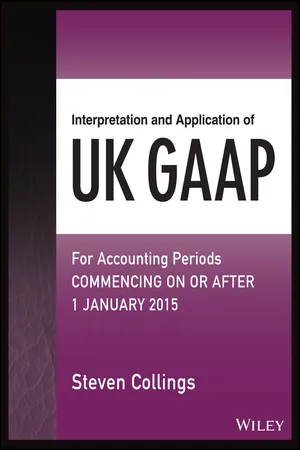
Interpretation and Application of UK GAAP
For Accounting Periods Commencing On or After 1 January 2015
- English
- ePUB (mobile friendly)
- Available on iOS & Android
Interpretation and Application of UK GAAP
For Accounting Periods Commencing On or After 1 January 2015
About this book
Interpretation and Application of UK GAAP is a comprehensive, practical guide to applying UK GAAP at all levels, for accounting periods commencing on or after January 1, 2015. This book examines all of the core principles for every business, from subsidiaries of major listed companies right down to the very small, owner-managed business. Each chapter includes a list of relevant disclosure requirements to facilitate understanding, and real-world examples bring theory to life to provide guidance toward everyday application. Readers gain practical insight into the preparation of accounts under the EU-adopted IFRS, FRSs 100, 101, and 102, the FRSSE, and the Companies Act 2006, with expert guidance as to which requirements apply in which situations, and to which companies, and the type of disclosure each scenario requires. The book also includes detailed analysis of the planned changes to the Small Companies' Regime which are scheduled to take effect in 2016.
With sweeping changes coming into effect from January 1st 2015, financial statement preparers must have a sound appreciation of how the new UK GAAP works. This book provides a complete guide, with the latest regulations and straightforward advice on usage.
- Understand UK GAAP application at all levels
- Learn how to handle all relevant key accounting treatments
- Refer to complete disclosure requirement lists for each topic
- Get up to date on the latest area-specific practices
With new accounting practices in many broad areas including investment property, inventory valuations, deferred tax, fixed assets, and more, auditors and accountants need an awareness of how the new financial reporting regime will affect them. Interpretation and Application of UK GAAP is the most comprehensive reference, with the latest information and practical guidance.
Tools to learn more effectively

Saving Books

Keyword Search

Annotating Text

Listen to it instead
Information
Chapter 1
General Requirements of the Companies Act 2006
- Introduction
- Accounting Requirements under the Companies Act 2006
- True and Fair and Adequate Accounting Records
- International Financial Reporting Standards
- Generally Accepted Accounting Practice
- Substance of Transactions
- Directors' Reports
- Group Accounts
- Approval of Financial Statements
- Interaction of FRS 102 Terminology with Companies Act 2006 Terminology
- Micro-Entities Legislation
Introduction
- The Association of Chartered Certified Accountants (ACCA)
- The Chartered Institute of Public Finance and Accountancy (CIPFA)
- The Institute of Chartered Accountants in England and Wales (ICAEW)
- The Institute of Chartered Accountants in Ireland (ICAI)
- The Institute of Chartered Accountants in Scotland (ICAS)
Table of contents
- Cover
- Title Page
- Copyright
- Table of Contents
- About the Author
- Foreword
- Preface
- Acknowledgements
- Introduction
- Chapter 1: General Requirements of the Companies Act 2006
- Chapter 2: The Statutory Audit Requirement and Accounting Principles
- Chapter 3: The Primary Financial Statements and Disclosure Notes
- Chapter 4: Financial Reporting for Smaller Companies
- Chapter 5: Summary of the Key Differences between FRS 102 and ‘Old’ UK GAAP
- Chapter 6: Consolidated and Separate Financial Statements
- Chapter 7: Accounting Policies, Estimates and Errors
- Chapter 8: Revenue Recognition
- Chapter 9: Assets Held for Sale and Discontinued Operations
- Chapter 10: Employee Benefits
- Chapter 11: Income Tax
- Chapter 12: Intangible Assets
- Chapter 13: Property, Plant and Equipment and Investment Properties
- Chapter 14: Borrowing Costs
- Chapter 15: Impairment of Assets
- Chapter 16: Government Grants
- Chapter 17: Financial Instruments
- Chapter 18: Inventories and Work-in-Progress
- Chapter 19: Share-based Payment
- Chapter 20: Leases
- Chapter 21: Provisions and Contingencies
- Chapter 22: Statement of Cash Flows
- Chapter 23: Investments in Associates and Joint Ventures
- Chapter 24: Related Parties
- Chapter 25: Specialised Activities
- Chapter 26: Liabilities and Equity
- Chapter 27: Events after the Reporting Period
- Chapter 28: Foreign Currency Translation
- Chapter 29: Small Company Abbreviated Financial Statements
- Chapter 30: Reduced Disclosure Framework
- Chapter 31: First-Time Adoption of FRS 102
- Index
- End User License Agreement
Frequently asked questions
- Essential is ideal for learners and professionals who enjoy exploring a wide range of subjects. Access the Essential Library with 800,000+ trusted titles and best-sellers across business, personal growth, and the humanities. Includes unlimited reading time and Standard Read Aloud voice.
- Complete: Perfect for advanced learners and researchers needing full, unrestricted access. Unlock 1.4M+ books across hundreds of subjects, including academic and specialized titles. The Complete Plan also includes advanced features like Premium Read Aloud and Research Assistant.
Please note we cannot support devices running on iOS 13 and Android 7 or earlier. Learn more about using the app